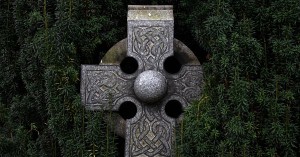Today I shared this outstanding piece from the Circe Institute on Facebook, and provoked quite a discussion. In the article itself, Joshua Gibbs makes the point that the common evangelical response to ecumenical controversy (“good Christians disagree on this”) is a cop-out that divorces truth from goodness and leaves young people with the impression that doctrines not essential for salvation are unimportant. It’s worth a read in its own right, but what I want to talk about is the debate it sparked in the comments section of my Facebook page–not about the main point, but about the example Gibbs uses: cremation.
 One friend quickly remarked that he finds the Christian arguments against cremation from people like Al Mohler and N. T. Wright “utterly nonsensical” and “irrelevant.” Now, to be fair, during our lengthy exchange, this friend moderated his language and said he would have preferred to describe the arguments against cremation as unconvincing. I quote his initially strong reaction because I think it represents a huge swath of modern evangelicals who can’t imagine why burning the dead bodies of their loved ones is a problem, and who find symbolic arguments in general puzzling. If God can bring people back to bodily life in the Resurrection without their bodies or bones intact, why does it matter how we dispose of the dead?
One friend quickly remarked that he finds the Christian arguments against cremation from people like Al Mohler and N. T. Wright “utterly nonsensical” and “irrelevant.” Now, to be fair, during our lengthy exchange, this friend moderated his language and said he would have preferred to describe the arguments against cremation as unconvincing. I quote his initially strong reaction because I think it represents a huge swath of modern evangelicals who can’t imagine why burning the dead bodies of their loved ones is a problem, and who find symbolic arguments in general puzzling. If God can bring people back to bodily life in the Resurrection without their bodies or bones intact, why does it matter how we dispose of the dead?
But before I get to my argument, a brief second example. In another post, I point out how many of my Christian friends are using that new smart phone app that morphs a user’s photo into an opposite-sex version of themselves, as well as aging them. “Will and grace still works today,” I remarked, and later I added, “this is what being on the losing side looks like.” Predictably I got push-back from Christians in my own denomination (the Presbyterian Church in America), who considered digital gender-bending nothing more than a little innocent fun. The idea that it might not be a good idea to engage in this odd pastime precisely when Christianity is in fiercest conflict with our culture over the objective reality of sex and gender never seemed to occur to them. The possibility that, like early depictions of homosexuality on television, feminizing or masculizing themselves on their iPhones could desensitize their Facebook followers to transgender ideology never crossed their minds. Such symbols and rituals, they assume, have no impact.
But back to cremation. I asked my friend who saw no reason for burial over burning whether he bows his head, kneels, or closes his eyes during prayer. He replied that yes, he does. I asked him whether he believes these postures are necessary for God to hear his prayers. “Of course not,” he answered. So I asked why he still engages in them. He replied that they seem to be normative in Scripture. So I asked whether he knew of any cremations performed by the people of God in the Bible, and whether he thought cremation, as a mode of body-disposal, has any theological or symbolic significance.
At this point, he guessed where I was going, but asked me to continue. So I asked whether he would be bothered if his mother died and someone threw her body in the garbage or dropped it in a pit filled with human waste. He answered that he would be outraged by such “defilement,” but that this could be a sentimental rather than a theological reaction. I then asked whether he would be okay with Joseph of Arimathea dumping Jesus’ body in a sewer after the crucifixion. “That’s my Lord,” he said. “It would be disrespectful and hateful to embarrassingly subject His body to something like that.”
The point by now had become obvious.
If we find what happened to Jesus’ body or what happens to the body of a loved one after death important enough to reject “defilement,” then we need to admit that we do, in fact, ascribe symbolic importance to what we do with the bodies of the dead, and see dumping them like refuse as a grave error. Everyone agrees that the manner of burial has precisely zero impact on God’s ability to “open the graves” on the last day. The sea, after all, will “give up its dead,” and we know a corpse underwater disintegrates in mere days.
The reason I still object to cremation, and why I think it’s anything but “utterly nonsensical” to do so, is that burning and crushing a body into powder says something about it. It has symbolic significance, and all mankind throughout all of history until very recently has understood this.
In the West, burning is what you do with garbage. You incinerate it and throw away its ashes, so that you never have to look at it or smell it again. It’s gone, never to return. In other cultures, burning is what you do with dead bodies because it visually symbolizes the dispersion of the person’s life-force into the cosmos, or their becoming one with the universe. It is very much consistent with Eastern philosophy, in which losing one’s bodily existence and individuality is salvation.
Christianity is different. Christianity sees the body neither as trash, nor as a vessel to shed as you disperse and become one with the universe. It sees the body as a temple and a precious home created by God to live forever and assumed forever by God in the Person of Christ. That is why in the New Testament, when a person dies, they are often said to have “fallen asleep.” They are not dispersing. They’re coming back. They’re going to wake up. We have this hope because Christ, the firstborn from the dead, woke up from His slumber and promised us the same salvation.
We know from the rest of the New Testament that the soul is not sleeping. It’s the body that’s sleeping. And it’s going to wake up. So we lay the dead down in honor, covered in flowers, in beautiful boxes (though modern funerals are far too expensive, which is a separate issue worth discussing). We dedicate plots of beautiful land to the dead, in the hope and knowledge that they will one day rise up and see the Lord with their own eyes. You don’t burn sleeping people. You lay them to rest.
Thus, for a Christian to burn a body has symbolic significance. It says something about what we expect for that body. Of course, bodies decay. That is part of the fall. And of course, the God who made Heaven and Earth does not need a complete skeleton or a perfectly embalmed mummy to get the job of resurrection done. He is not Osiris.
But Jesus left an empty tomb. He got up and walked out with the same body He had when they laid Him inside, in a glorified, deathless state. There was real continuity. And those who buried Him rightly honored His body, rather than treating it as refuse or something never again to be used.
I write all of this to make a simple point: symbols matter, and the evangelical instinct to dismiss things like cremation or gender-morphing smart phone apps is a serious theological weakness with practical consequences. What we say about our loved ones’ bodies and our own by the way we treat them does more than send messages about our underlying beliefs. Such behaviors actually reshape those beliefs.
Humans are creatures of habit, and we very quickly come to feel and believe what we do. Hands follow hearts, but the opposite is true, as well. C. S. Lewis observed that if you want to love a person, the best thing to do is often to simply act as if you love them, and feelings will very quickly follow. The same, I think, is true with cremation and digital shenanigans. And you can see and hear the results of our practice every time a grieving Baptist widow says, “I know Harold is not here in this box. I know that body in there is not him.” Could the Disciples have rightly said that of Jesus’ body when it was placed in the tomb?
Friends, symbols matter. They are a language. And if we continue telling lies in that language, we can’t blame anyone for misunderstanding us or our faith.












